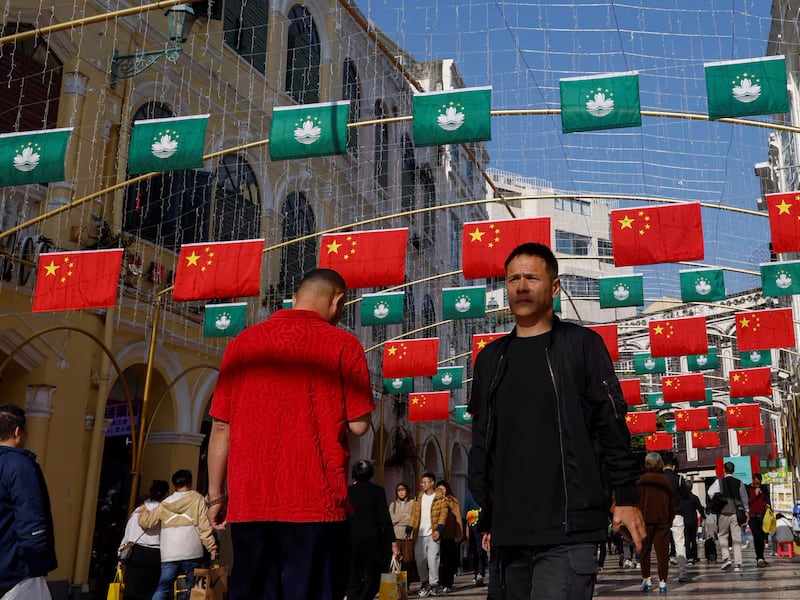Chinese President Xi Jinping left Macau on Friday after a three-day ceremonial visit to mark the 25th anniversary of the former Portuguese enclave’s handover to Chinese rule, after laying out his vision for the role the gambling hub will play in his plans to boost China’s flagging economy.
“Macau is a shining pearl inlaid on the coast of the South China Sea and a treasured part of our great motherland,” Xi said in his keynote speech marking Friday’s anniversary, and inaugurating the next city government.
“The earliest Chinese students to go overseas went out to the world from here, many Chinese classics were translated and spread to the West, and modern Western science, technology and culture were introduced to mainland China via Macau,” he said.
“At different times in history, Macau has played an important role and made unique contributions,” Xi said.
Xi said Macau’s economic growth is now seven times what it was at the 1999 handover.
The city’s key task is now to “actively integrate into overall national development,” he said.
What does that mean in practice?
Xi wants the city to “actively participate” in his signature Belt and Road global infrastructure and supply chain project, as part of the “Greater Bay Area” integrating the city with neighboring Guangdong province and the former British colony of Hong Kong.
In 2021, the ruling Chinese Communist Party launched a semi-conductor research and development base jointly administered by authorities in the southern province of Guangdong and the formerly Portuguese city of Macau on Hengqin Island, paving the way for a blurring of the border between the two jurisdictions.
The “cooperation zone” on Hengqin Island is jointly administered by Guangdong and Macau, with a Communist Party, police, state security police and government presence.
The aim is to fast-track semiconductor chip designs and other high-tech research and development projects including new energy, big data, artificial intelligence and biomedical industries.

Beijing wants relatively cash-rich Macau to move away from its status as a gambling hub and plow funding into the Hengqin project and boost the mainland Chinese economy through innovation.
Xi also said Macau has “more prominent” advantages when it comes to acting as a platform for “China-foreign cultural exchange and cooperation.”
What does it mean for Hong Kong?
Xi’s description of Macau as “a higher-level platform for opening-up” suggests that Beijing now favors the city as its gateway to the rest of the world, a role held by Hong Kong for more than a century.
But Macau journalist Roy Choi said the city lacks Hong Kong’s advantages.
“Firstly, Macau’s financial system and laws aren’t up to level of Hong Kong’s, which is a common law jurisdiction, and secondly, it doesn’t have a large port, so it won’t be able to replace Hong Kong in terms of infrastructure.”
“But Beijing is anxious right now, so it thinks Macau is the way to go.”
RELATED STORIES
Xi Jinping arrives in Macau to mark 25 years of Chinese rule
China Announces Border ‘Cooperation’ Zone in Macau, Eyes High-End Chip Development
EXPLAINED: Who will be the next leader of Macau?
Political commentators say China is rewriting its idea of the “one country, two systems” framework under which Hong Kong and Macau were returned to mean that the two former colonies can keep their separate jurisdictions only insofar as it benefits China as a whole.
“It ... means that the mainland is the foundation, and Macau and Hong Kong are branches and are there to serve the mainland,” political analyst Chen Daoyin told RFA Mandarin in a recent interview. “The main point is that Hong Kong and Macau must be integrated into the overall framework of China’s modernization and must not create anything unique to them.”
What about the promises of autonomy?
Xi’s Macau visit coincided the 40th anniversary of the signing of the Sino-British Joint Declaration, which promised Hong Kong a “high degree of autonomy” for at least 50 years after the 1997 handover.
The last British governor of Hong Kong, Chris Patten, hit out at Beijing’s “flagrant disregard” of its commitments in the U.N.-registered treaty in a newspaper article on Thursday, accusing it of comprehensively crushing the city’s freedoms under two national security laws that followed the 2019 protest movement, and calling for sanctions from London in response.

Xi’s singling out of Macau as a favored location for global exchanges is in keeping with the fact that the city has never mounted any serious political challenge to the will of Beijing, and, unlike Hong Kong, was never promised fully democratic elections in the first place.
The city’s political and financial elite, exemplified by mainland-born incoming Chief Executive Sam Hou Fai, have always been more closely aligned with Chinese political goals than the former British colony of Hong Kong, and have never really wanted democracy, experts say.
In that sense, the city is living up to its reputation as the “well-behaved child,” while Hong Kong remains in a cycle of political repression following waves of mass popular protest since its handover to Chinese rule.
Translated by Luisetta Mudie. Edited by Malcolm Foster.
